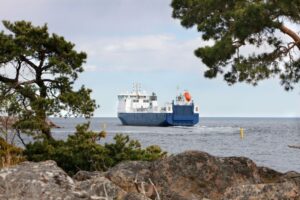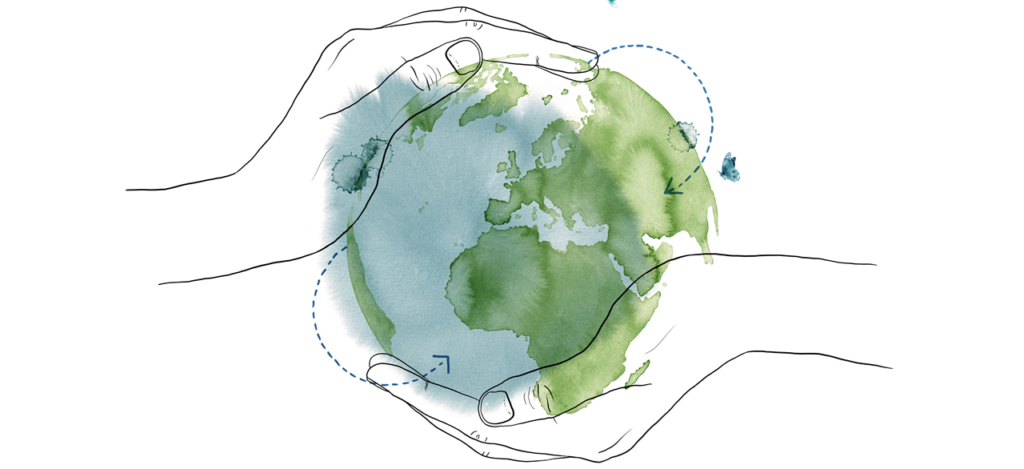This text is older than 3 years old and could contain inactive information.
Sustainability work – a job that never ends, is never finished
Sustainability is a broad concept that is usually associated with climate and the environment. But it’s much bigger than that. Work on sustainable development has been in progress for a long time at SKB, the Swedish Nuclear Fuel and Waste Management Company, and has always been a feature of our operations. It’s a job that will never be finished.
– SKB’s mandate is to take care of radioactive waste safely says Erik Setzman, Environmental Coordinator at SKB.

Erik Setzman.
Erik has been working on sustainability issues for a long time. He believes that SKB’s entire mandate is actually based on considerations of sustainability in various ways.
– After all, the core of the mandate is to take care of radioactive waste safely, for people and for the environment, he says. This has always been a feature of SKB’s work, in everything from developing the method of handling the waste to providing citizens with access to information about how SKB is working on the issue.
The method itself is rooted in nature. The three barriers, copper, bentonite and rock, are natural materials that have been around for millions of years. This means that there is good historical knowledge of how the materials behave and interact. Together they form a kind of cycle.
Access to information and knowledge for citizens is also important in order that the mandate can be implemented in a socially sustainable way.
The three areas of sustainability
To get a general understanding of why sustainability is such a huge concept, you first need to be aware that it is divided into three areas: ecological, social and economic sustainability. As a company, you then need to break down these areas to develop specific activities to work with.
Ecological sustainability is usually considered to form the basis of the two other kinds. It is about the Earth’s ecosystem and adopting a long-term approach so that it can continue to function, for example providing us with clean water and clean air.
Social sustainability encompasses the human perspective. This includes, for example, health, education, security and justice, and striving for an even distribution in the world.
Economic sustainability means that economics and growth must not get in the way of ecological and social sustainability. We make use of smart economic models designed to contribute to the whole, both ecologically and socially.
From orchids to non-fossil fuel
Since SKB signed sustainability promises with the County Administrative Board in Uppsala just over a year ago, work in the area has intensified and become clearer. During the year, a mapping exercise was conducted in the form of a materiality analysis, in order to find out where the company stands in its sustainability work. The analysis has made it clearer what can be highlighted about sustainability work and which areas should be focused on.
– We’ve also had the opportunity during the course of our work to put sustainability labels on things that are under way or that we’ve already done, says Erik Setzman.
– Our nature conservation efforts to improve conditions for endangered species in Forsmark, such as annual inventories of the fen orchid, and the construction of new ponds for pool frogs, are one example. Another is support for the development of the local business community and associations in our host municipalities, by such means as value-added programmes and sponsorship. A third is that we are now replacing fossil diesel with the non-fossil fuel HVO100 in our vehicles and machines.
All links in the value chain must be interconnected
The management team at SKB decided some time ago on focus areas for continued work, and that a programme for Sustainable Construction and Operation at SKB is to be drawn up. With the aid of special workgroups, the programme is to be completed by the summer. Five focus areas were identified in the materiality analysis: Limit climate impact, Ecosystems and biodiversity, Personnel, health and safety, The local community and Sustainable supply chain.
– If we take Sustainable supply chain as an example to show what opportunities there are to work sustainably, it includes specifying clear requirements when procuring materials, products and services. This enables us to reduce our climate impact from a life cycle perspective – all links in the value chain must be interconnected, says Erik Setzman.
Many ways to reduce climate impact
Limiting climate impact in both the short term and the long term can be achieved in many different ways. In this respect, SKB benefits from the climate and energy survey of the entire operation that was conducted in 2020 to identify possible measures and which ones have the greatest effect.
In the short term this may involve travelling less and in environment-friendlier ways, replacing fossil fuels with non-fossil, replacing old lighting with LED, finding more efficient heat pumps and utilising residual heat, and improving ventilation in buildings and installations. In the long term, we need to work on a broad front, in everything from how to build energy-efficiently and climate-smart, to the use of electric vehicles and machines in future plants.
Transport activities can be made more efficient
At present, the transport vessel m/s Sigrid accounts for the biggest climate impact, representing around 70 per cent of the company’s total climate impact.

M/s Sigrid.
Like most ships, m/s Sigrid is powered by fossil marine diesel. The ship is modern and has a high environmental performance. The fuel has a low sulphur content and, thanks to a high degree of purification, there are also limited emissions of nitrogen oxides and particles, etc. But developments have moved apace since she was built and commissioned. Demands and expectations have also increased in terms of reducing CO2 emissions and climate impact from heavy transport operations and shipping.
– We’re already switching to operating m/s Sigrid with 10 per cent HVO this year. This will significantly reduce our carbon footprint, says Erik Setzman.
There are also opportunities to further reduce the ship’s climate impact. These include reviewing the routes she takes and making them as efficient as possible by means of good coordination with the nuclear power plants.
Everyone can contribute to sustainable development
When the sustainability programme is done and dusted, Erik Setzman and his colleagues look forward to getting everyone at the company to take on board its direction and content, contribute to its implementation and thereby take SKB into the future sustainably, whatever work they are doing. Because one thing is certain: everyone can contribute to sustainable development.
– Sustainability work includes both large-scale and small-scale measures. It may involve major issues such as reducing m/s Sigrid’s climate impact or promoting equality, equal treatment and decent working conditions, in our suppliers’ operations as well as our own.But it also includes relatively simple measures such as installing charging stations in all our parking spaces. All elements are important in themselves and you have to bear in mind that ‘every little helps’.
– This is the only way we can move forward and leave a small footprint behind us, says Erik Setzman.
News
SKB signs collaboration agreement for the Spent Fuel Repository
Published: 18 June 2025
Drones streamline inspections and patrols at SFR
Published: 17 June 2025
Blasting starts on the SFR extension in Forsmark
Published: 23 January 2025
Construction begins on Swedish Spent Fuel Repository
Published: 15 January 2025
SKB to weld canisters for world’s first final repository
Published: 16 December 2024
